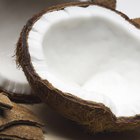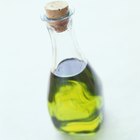
There are numerous cooking oils on the market, each with their own virtues. One thing all oils have in common is that they will begin to smoke and break down if overheated. That temperature, called the smoke point, will vary from oil to oil depending on its source and how thoroughly it's refined. The best oils for high temperature cooking are those with the highest smoke points.
Measuring Smoke Points
There are several difficulties standing in the way of any authoritative, once-and-for-all guide to the smoke points of various oils. The climate and location the oil was produced in, its age, its purity and degree of refinement all play a part in when the oil begins to break down. Another thorny question is when the oil is considered to smoke: at the first wisp? At a given degree of visibility? In practice most vegetable oils, when fresh, can be used at temperatures well in excess of the normal frying temperature of 350 to 375 degrees.
High Temperature Oils
Several oils are well-suited for use at higher than normal frying temperatures. Grapeseed oil has a high smoke point and a neutral flavor, making it a good choice for most purposes. Peanut oil also performs well at high temperatures, though it does have a noticeable flavor and is a potential allergen. Sunflower, safflower, soybean and canola oil are all capable of high temperature cooking, though individual variability from bottle to bottle makes it difficult to say definitively which has the highest smoke point.
Special Cases: Butter and Olive Oil
Butter and olive oil are both cherished for their flavors, and both are generally considered unsuitable for high temperature use. Butter is a mediocre frying fat because it contains both water and milk solids, impurities that reduce its useful temperature. However, if the butter is melted and the water and solids are removed then the remaining, or clarified, butter can be used for high-temperature frying. Most olive oils can also be used for frying at higher temperatures, though their unique flavors are destroyed in the process. Olive oil remains a healthy choice, flavor notwithstanding.
Other Considerations
Sheer high temperature performance is not the only factor to be considered in choosing a cooking oil. Avocado oil has a high smoke point, but its cost makes it impractical for day-to-day use. Many oils are partially hydrogenated to improve their shelf life, and these should be avoided. Read the labels and compare the levels of saturated fats, polyunsaturates and monounsaturates. Polyunsaturated fats are thought to help control cholesterol, while monounsaturated fats stabilize blood sugar. Some labels will also specify levels of Omega 3 and Omega 6 fatty acids, with Omega 3 being more desirable.
Related Articles

Substitutes for Groundnut Oil in Cooking

What Is the Difference Between Coconut ...

Can Doughnuts Be Deep Fried in Olive ...

Cooking Oils With Low Smell

What Kind of Oil Should I Use to ...

What Kind of Oil Do You Use in Brownie ...

Can I Make Fried Chicken With Butter ...

Differences Between Roasted & Raw Nut ...

What Is Expeller Pressed Canola Oil?
How Long Can You Keep and Reuse Peanut ...

Clove Oil & Pimples

Jojoba Oil Benefits

Can You Use Olive Oil in a Bread Mix?

Peppermint Oil for Nasal Congestion

Does Canola Oil Taste the Same as ...

Cold Pressed vs. Expeller Pressed

Almond Oil Cooking Substitution

Which Olive Oil Is Best to Fry With?

Eucalyptus Oil & Acne

How to Remove Tanning Oil
References
- Cooking for Engineers; Smoke Points of Various Fats; Michael Chiu
- Washington Post; Where There's Smoke, There's a Fryer; Robert L. Wolke; May 2007
- New York Times; Is It Time for an Oil Change in the Kitchen?; Harold S. McGee; November 2010
- Mayo Clinic: Dietary Fats: Know Which Types to Choose
- Medline Plus: Fat
Resources
- "On Food and Cooking: The Science and Lore of the Kitchen"; Harold S. McGee; 2004
- "What Einstein Told His Cook"; Robert L. Wolke; 2002
Writer Bio
Fred Decker is a trained chef and prolific freelance writer. In previous careers, he sold insurance and mutual funds, and was a longtime retailer. He was educated at Memorial University of Newfoundland and the Northern Alberta Institute of Technology. His articles have appeared on numerous home and garden sites including GoneOutdoors, TheNest and eHow.
Photo Credits
Hemera Technologies/AbleStock.com/Getty Images